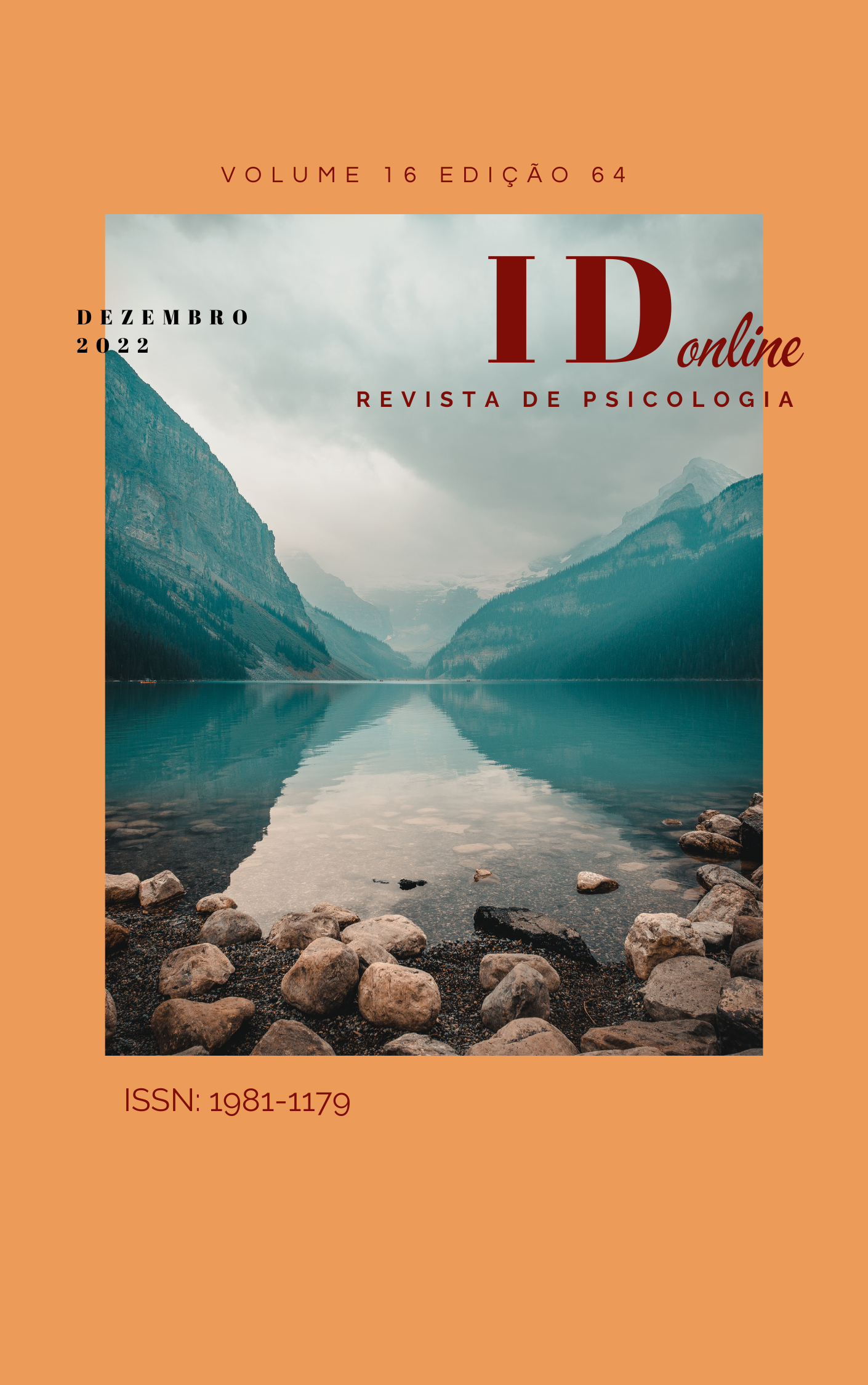Benefícios da abordagem fisioterapêutica através da equoterapia em crianças com Síndrome de Down: uma revisão integrativa
DOI:
https://doi.org/10.14295/idonline.v16i64.3662Palavras-chave:
síndrome de down, terapia assistida por cavalos, equilíbrio posturalResumo
A Síndrome de Down trata-se de uma alteração da conformação cromossômica, onde, habitualmente, os cromossomos deveriam estar organizados em duplas, se apresentam em trio a nível do par vinte e um. Têm-se como abordagem fisioterapêutica a equoterapia onde a escolha do animal como recurso cinesioterapêutico advém do aprimoramento motor, do estímulo de força muscular e propriocepção, do desenvolvimento das sinergias globais, equilíbrio dinâmico e estático e integração sensorial, além da motricidade fina, promovidos pela variabilidade de movimento imposta pelo cavalo. O objetivo desta pesquisa foi elencar os benefícios da abordagem fisioterapêutica em crianças com Síndrome de Down através da equoterapia. A revisão foi feita partindo de duas bases de dados (BVS e google acadêmico). Foram encontrados 188 artigos, sendo 18 na BVS e 170 no google acadêmico, após a aplicação dos critérios 4 (quatro) estudos foram incluídos nesta pesquisa. Os estudos mostraram efeitos benéficos na ativação muscular, equilíbrio postural, capacidade funcional e alinhamento articular.
Downloads
Referências
BOTELHO, Louise Lira Roedel; CUNHA, Cristiano Castro de Almeida; MACEDO, Marcelo. O método da revisão integrativa nos estudos organizacionais. Gestão e Sociedade. Belo Horizonte, v.5, n. 11, p. 121-136 · maio-ago. 2011 · ISSN 1980-5756. DOI: https://doi.org/10.21171/ges.v5i11.1220
COSTA, Valéria Sovat de Freitas; SILVA, Hudday Mendes da; AZEVÊDO, Monique de; SILVA, André Ribeiro da; CABRAL, Ludmila Lucena Pereira; BARROS, Jonatas de França. Effect of hippotherapy in the global motor coordination in individuals with Down Syndrome. Fisioterapia em Movimento, 2017, v. 30, suppl pp. 229-240. DOI: 10.1590/1980-5918.030.S01. DOI: https://doi.org/10.1590/1980-5918.030.s01.ao22
DORALP, Samantha .Embracing Variability and Repetition in Practice: A Commentary on Outcomes following Physical Therapy Incorporating Hippotherapy on Neuromotor Function and Bladder Control in Children with down Syndrome: A Case Series. Physical & Occupational Therapy In Pediatrics, 2020, 40:3, 261262. DOI: 10.1080/01942638.2020.1746900. DOI: https://doi.org/10.1080/01942638.2020.1746900
ESPINDULA, Ana Paula; RIBEIRO, Mariane Fernandes; PASCUCCI, Luciane Aparecida; SOUZA, Sande de; FERREIRA, Alex Abadio; FERRAZ, Mara Lúcia da Fonseca; TEIXEIRA, Vicente de Paula Antunes. Effects of hippotherapy on posture in individuals with Down Syndrome. Fisioterapia em Movimento [online]. 2016, v. 29, n. 3. DOI: https://doi.org/10.1590/1980-5918.029.003.AO07
GANNOTTI, M.E.; CHRISTY, J.B.; HEATHCOCK, J.C.; KOLOBE, T.H., A path model for evaluating dosing parameters for children with cerebral palsy. Physical Therapy, 94(3):411–421, 2014. DOI: https://doi.org/10.2522/ptj.20130022
MORIELLO, Gabriele; TERPSTRA, Mary Ellen; EARL, Jeremy. Outcomes following physical therapy incorporating hippotherapy on neuromotor function and bladder control in children with Down syndrome: A case series. Physical & Occupational Therapy In Pediatrics, 2020. 40:3, 247-260. DOI: https://doi.org/10.1080/01942638.2019.1615601
RIBEIRO, Mariane Fernandes; ESPINDULA, Ana Paula; PASCUCCI, Luciane Aparecida; SOUZA, Sande de; FERREIRA, Alex Abadio; FERRAZ, Mara Lúcia da Fonseca; TEIXEIRA. Avaliação postural pré e pós-Tratamento equoterapêutico em indivíduos com síndrome de Down. ConScientiae Saúde, [s. l.], v. 15, n. 2, 2016. DOI: https://doi.org/10.5585/conssaude.v15n2.6319
RIBEIRO, Mariane Fernandes; ESPINDULA, Ana Paula; PASCUCCI, Luciane Aparecida; SOUZA, Sande de; FERREIRA, Alex Abadio; FERRAZ, Mara Lúcia da Fonseca; TEIXEIRA Electromyographic evaluation of the lower limbs of patients with Down syndrome in hippotherapy. Acta Scientiarum, [s. l.], v. 39, p. 17 -26, jan./jun. 2017. DOI: https://doi.org/10.4025/actascihealthsci.v39i1.28868
SCHORNE, G.; DE BITTENCOURT, D.C.; HOLLER, A.. Aplicabilidade das técnicas holísticas na prática fisioterapêutica. Revista Saude Integrada, 7:89– 105, 2015.
SILKWOOD-SHERER D, KILLIAN C, LONG M, MARTIN K. Hippotherapy: an intervention to habilitate balance deficits in children with movement disorders: a clinical trial. Phys Ther 2012; 92: 707-17. DOI: https://doi.org/10.2522/ptj.20110081
TORQUATO JA, LANÇA AF, PEREIRA D, CARVALHO FG, DA SILVA RD. A aquisição da motricidade em crianças portadoras de síndrome de Down que realizam fisioterapia ou praticam equoterapia. Fisioter Mov 2013; 26: 515-24. DOI: https://doi.org/10.1590/S0103-51502013000300005
VILLARROYA MA, AGUERO, González A, GARCÍA T, DE LA FLOR-Marín M, MORENO LA, CASAJÚS JA. Static standing balance in adolescents with Down syndrome. Rev Dev Disabil 2012; 33: 1294-300. DOI: https://doi.org/10.1016/j.ridd.2012.02.017
Downloads
Publicado
Como Citar
Edição
Seção
Licença
Copyright (c) 2022 Larissa Silva Santos; Letícia Luz Rêgo; Carla Pequeno da Silva

Este trabalho está licenciado sob uma licença Creative Commons Attribution-NonCommercial 4.0 International License.
Os autores detêm os direitos autorais sem restrições, devendo informar a publicação inicial nesta revista, em caso de nova publicação de algum trabalho.










